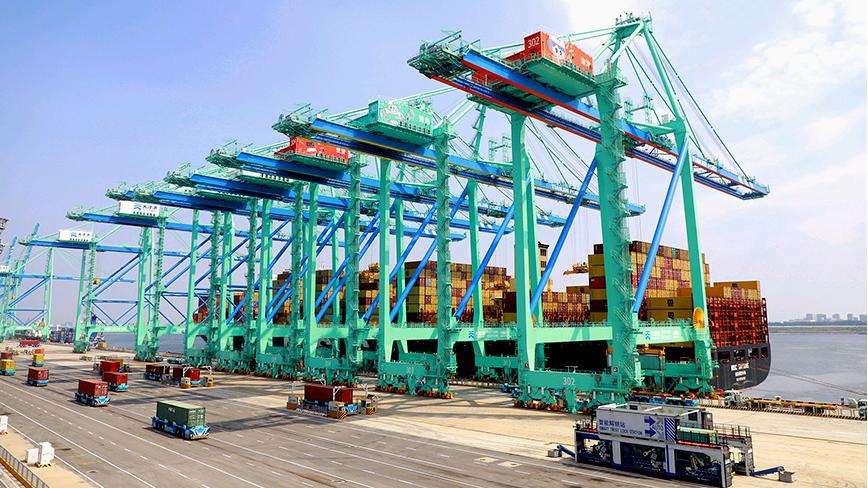Israel, US blamed for prolonging Gaza conflict
Editor's note: Monday marked one year since the outbreak of the devastating Palestine-Israel conflict, triggered by Hamas' Oct 7, 2023, attacks. Beyond the statistics, this page delves into the global implications of unchecked violence, Washington's controversial role, and the growing demand for justice.
To many, Monday marked a somber anniversary: a year of Israeli killings of Palestinians and turning Gaza into uninhabitable ruins, in disregard of international law and UN resolutions. And the US, for its blind support of Israel, has been called complicit in the creation and prolongation of one of this century's worst humanitarian crises.
More than 41,900 Palestinians have been confirmed dead and about 100,000 injured, not only in strikes on military facilities but more frequently on residential buildings, hospitals, schools, and even humanitarian aid convoys. Hundreds of journalists and UN workers have also been killed, and many more are believed to be buried in the rubble, which could take years to clear.
While the extreme Hamas attacks on Oct 7 last year, which claimed more than 1,250 Israeli and foreign lives and saw more than 200 people abducted, initially shocked the world, the yearlong Israeli military assault has since, to a certain extent, overshadowed those events.
Analysts said the White House has largely ignored the current alleged genocide — tearing out the once rules-based international order and sinking US moral prestige and credit.
In protest against Washington's backing of such daily attacks, US journalist Samuel Mena Jr set himself on fire outside the White House on Saturday, severely burning his left arm. Earlier on Feb 25, Aaron Bushnell, a young US Air Force serviceman, died after setting himself ablaze outside the Israeli embassy in Washington, while declaring he "will no longer be complicit in genocide".
In recent weeks, cities worldwide have witnessed both pro-Israeli and pro-Palestinian demonstrations demanding an immediate cease-fire and the release of hostages. The growing global outcry is also pushing for the United States — Israel's largest arms supplier — to halt its military support.
Since the conflict began, the US has enacted legislation providing at least $12.5 billion in military aid to Israel, including $3.8 billion from a bill in March and $8.7 billion from a supplemental appropriations act in April, according to the US think tank Council on Foreign Relations.
US Representative Cori Bush of Missouri said so much of the violence could have been prevented "if our government had the moral foresight and clarity to invest in peace and diplomacy instead of violence and war".
She questioned US President Joe Biden on X last week regarding how many lives must be taken "for you to finally say no more".
Ayman Yousef, a professor of international relations at the Arab American University in Jenin, West Bank, lamented that despite a year of fighting in Gaza, the US position "had been totally in favor of Israel inside of the occupation".
"Although the United States put some efforts (into) increasing some political settlement or political deal between (the) Palestinian resistance group and Israel, in actual sense, it has been supporting Israel in terms of military support, economic support, and political support," Yousef told China Daily. "The government of Israeli Prime Minister Benjamin Netanyahu has only a military agenda."
In his message to mark one year of the Palestine-Israel conflict, United Nations Secretary-General Antonio Guterres said it is "time to silence the guns" and "stop the suffering that has engulfed the region". "Time for peace, international law and justice," he said.
The UN Office for the Coordination of Humanitarian Affairs described the past year as one of "unimaginable suffering". According to the UN Satellite Centre, two-thirds of structures — a total of 163,778 buildings — in the Gaza Strip have sustained damage.
The center, in collaboration with the UN Food and Agriculture Organization, also released an update on the health and density of cropland in the Gaza Strip. About 68 percent of the permanent crop fields in the Gaza Strip "exhibited a significant decline in health and density" last month, it said.
Embargo demand
French President Emmanuel Macron became the latest prominent Western figure to publicly call for an international arms embargo against Israel amid rising Middle East tensions despite overwhelming calls for a cease-fire.
However, Netanyahu hit back on Sunday with a video on X saying "shame" on Macron and other Western leaders who were calling for the arms embargo against Israel when his country was "defending itself on seven fronts" against "the enemies of civilization", referring to Gaza, Lebanon, the West Bank, Yemen, Syria, Iraq, and Iran.
Last month, the British government announced it was suspending exports of some weapons to Israel over concerns they could be used to break international law.
Belen Fernandez, a columnist at Al Jazeera, noted in her article published on Wednesday that as Iran fired a barrage of missiles at Israel in retaliation for the latter's assassination of Hezbollah leader Hassan Nasrallah on Sept 27, and the killing of Hamas' political chief Ismail Haniyeh in July, Biden instructed the US military to assist Israel in neutralizing the missiles.
While many an international observer "has sounded the alarm that the US could now be 'dragged' into a regional war", in reality, the US is "not really being 'dragged' anywhere" but rather, it is "in a position entirely of its own making", she said.
The Stockholm International Peace Research Institute cited the US, Germany, and Italy as major arms suppliers to Israel. In the years 2019 to 2023, the US accounted for 69 percent of Israel's arms imports, upon which the Israel Defense Forces heavily rely.
As Washington carries on with its military and political support while contradictorily calling for a cease-fire in the process, there have been some opportunities to reverse the dreaded course for the past 12 months, as advised by international courts and the UN.
In January, the International Court of Justice issued provisional measures in a Genocide Convention case brought by South Africa in relation to the situation in Gaza.
The measures included Israel taking immediate steps to prevent its military from committing acts considered genocidal and to enable the provision of humanitarian assistance in Gaza.
In May, the court additionally ordered Israel to "immediately halt its military offensive" in the Rafah Governorate. The same month, International Criminal Court Prosecutor Karim Khan also sought arrest warrants for Israeli and Hamas leaders.
On Sept 18, the UN General Assembly overwhelmingly adopted a resolution demanding Israel bring to an end without delay its unlawful presence in the Occupied Palestinian Territory within 12 months.
The resolution also calls on states to cease the provision or transfer of arms, munitions, and related equipment to Israel.
Despite some of these advisories and warnings, not much has changed and the US continues to prioritize Israel's right to "self-defense" despite security dangers spreading.
Haydar Oruc, a former researcher at the Center for Middle Eastern Studies in Turkiye, blames the US political structure for being under the Jewish lobby, including the evangelicals who "put Israel's interests ahead of those of the US" and consider it a "religious duty to serve Israel".
"We are witnessing that the rulers of Israel are also aware of this power they possess and that they are pushing their influence on the US to the limit," Oruc said.
However, the current "irrational relationship between the US and Israel is causing great damage to the global system and its institutions" because Israel has not complied with any UN resolutions nor injunctions issued by the International Court of Justice.
"Similarly, due to US pressure, the International Criminal Court has been unable to issue arrest warrants against Netanyahu and (Israeli Defense Minister) Yoav Gallant," Oruc said.
Yousef from Jenin said the one year of fighting in Gaza meant Israel has "failed to achieve its declared objectives in liberating its prisoners and hostages from Palestinian guerrilla fighters".
Two-state solution
Iyad Eid, an assistant professor at the department of sociology and anthropology at the International Islamic University Malaysia, said the two-state solution remains a deeply important issue for Palestinians, who overwhelmingly support the establishment of their own state.
"However, they have encountered significant challenges, particularly from the Israeli side," said Eid, who is originally from Gaza and author of the upcoming book Tufan Al-Aqsa: The Day Hamas Defeated Israel.
He also recalled that just before Oct 7 last year, Netanyahu presented a map at the UN that "effectively rejected any engagement in peace talks with the Palestinians", undermining their prospects for statehood.
Additionally, several Israeli ministers, including Finance Minister Bezalel Smotrich, have publicly endorsed maps that envision an expanded Israel, encompassing territories from neighboring countries such as Egypt, Lebanon, Jordan, Saudi Arabia, and Syria, he said.
"This vision also includes the displacement of Palestinians from both Gaza and the West Bank. Most recently, the Israeli parliament voted to formally deny Palestinians the opportunity to establish their own state, despite the fact that more than 140 countries have already recognized Palestinian statehood."
Despite this, he said it was still possible to achieve a two-state solution "if Israelis would accept it".
"The new government has one plan. Just to control the whole land. This is why the two-state solution is a hope," he said.
Oruc said the US must "urgently end its support for Israel" or it would "not have any credibility or reliability".
Photos
Related Stories
- U.S. adds 254,000 jobs in September, higher than 12-month average
- 12 killed, 17 wounded in Israeli airstrikes on S. Lebanon
- Frontier Airlines plane catches fire while making emergency landing at Las Vegas airport
- Turkish plane carrying medical aid for Gazans lands in Egypt
- Death toll in Israeli airstrike on West Bank camp rises to 18
Copyright © 2024 People's Daily Online. All Rights Reserved.









